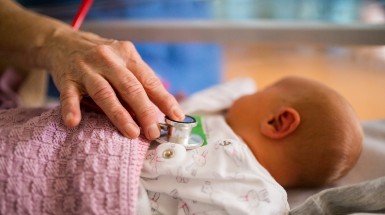Shared Learning Awards 2020 finalist: Bronchiolitis: when less is more
4 Nov 2020 03:15 PM
The Shared Learning Awards recognise the brilliant work being done to put NICE guidance and standards into practice in a range of organisations, including NHS, local authorities, and the voluntary sector. The following work has been shortlisted for the NICE Shared Learning Awards 2020 and represents one of our 3 finalists.

Shared learning example submitted by: Joanne McClune, ward sister, Maynard Sinclair Ward, Ulster Hospital, South Eastern Health and Social Care Trust
Bronchiolitis strongly contributes to winter pressures, impacting on acute paediatric services and on bed availability and patient flow in children’s wards. Not only that, it also adds to pressures on both nursing and medical staff and to the distress of babies and their families. At the Ulster Hospital, South Eastern Health and Social Care Trust, the children’s ward, known as the Maynard Sinclair Ward, consists of 20 beds, however often due to winter pressures and the addition of bronchiolitis, this overflows into the surgical ward impacting upon their service provision.
In 2018-19 a quality improvement (QI) project was undertaken by the ward to implement NICE guidance on Recommendations for Bronchiolitis in children: diagnosis and management (NG9). which provides recommendations on the diagnosis and management of bronchiolitis, admission criteria and discharge criteria. The team mapped out the patient’s journey from presenting at A&E to their eventual discharge and chose to focus on 3 clinical areas, the emergency department, the Children’s Short Stay Ward and the Maynard Sinclair Ward. They brought together a multidisciplinary team made up of staff with different areas of expertise and levels from all 3 clinical areas.
The project focussed on implementing NICE recommendations and aimed to achieve the following goals for infants under 1 year old with bronchiolitis:
- increase staff adherence to the guideline by 50% by March 2019
- decrease unnecessary interventions by 50% by March 2019
Implementing the recommendations has involved considerable change to everyday medical and nursing practice and the traditional way that infants with bronchiolitis have been cared for. Clinical interventions i.e. routine suction, or using certain medications, are no longer advised and the focus is now on minimal interventions. As such, opportunities to improve the overall efficiency of their service and provision of care for babies with bronchiolitis, including bed availability and patient flow, has improved. Nursing staff have found they have more time back by no longer focusing on unnecessary interventions and cost savings have resulted with the use of less interventions and medications.
All the initial aims that the team set out were achieved and, in fact, greatly exceeded. When compared to the winter period in 2017-18 where 89% of babies with bronchiolitis were receiving unnecessary clinical interventions, the use of the recommendations has seen these incidences reduced to 0%. Staff knowledge and adherence to the guidance also increased and confidence in caring for babies with bronchiolitis increased from 33% to 96%.
NICE guidance continues to be followed and good working relationships have been forged between the emergency department and children’s unit which are helping to bring about further improvements in care.
“The collaboration between our paediatric medical team and our emergency department during this project has greatly enhanced shared learning between us and increased confidence in managing bronchiolitis during a busy winter period. By listening to our teams, it was the simple things such as easily read posters and postcards with target observations and feed volumes that supported the greatest of change in our practice,” Dr Bernadette O'Connor, associate clinical director for paediatrics, consultant paediatrician.
- This work will be presented at the awards taking place virtually on Thursday 12 November, where the audience will be voting for the winner. Find out more about the event and how to register at www.nice.org.uk/news/events.
To find out more about this shared learning example here: https://www.nice.org.uk/about/what-we-do/into-practice/shared-learning-case-studies/shared-learning-awards/shared-learning-awards-2020/shared-learning-awards-2020-finalist---bronchiolitis--when-less-is-more